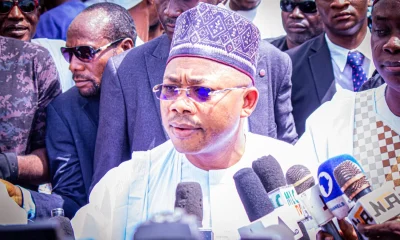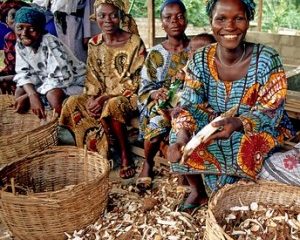EDITORIAL
Tribute to Pastor T.B.Joshua(1961-2021)

| One of the most renowned clergymen of this generation, Pastor. [known also as] Prophet Temitope Balogun [T.B.] Joshua who died on June 5 will be buried barely a month after his demise July 9 at the premises of the church he founded in Lagos, The The Synagogue Church Of All Nations.
[SCOAN].
Thousands of mourners from within the country and from no fewer than 50 countries of the world are expected to attend the solemn event.
This popular televangelist and philanthropist’s death has been devastating, to his church members and followers across the world who saw in him a miracle worker, true disciple of Jesus Christ, a philanthropist and one that was a true friend of the poor. Apart from his contribution to the growth of his religion, Christianity, Prophet T.B. Joshua will be missed for his unprecedented contribution to the nation’s tourism industry. The church he founded was a centre of tourism, of visits for leaders from all over the world: Ghana. South Africa, US,Asia, Caribbean, Europe etc. Hundreds, thousands came to the Synagogue Church of all Nations for their healings and deliverance. He will be greatly missed because to his credit, the poor, the less privileged sought refuge and succor at his place, and he was always there to welcome them and take care of them. Since his demise Nigerians from all walks of life and shades of opinion have been mourning this selfless Nigerian who lived entirely for the poor, the downtrodden and line with the teaching of hs religion . Throughout his lifetime there were no serious reports that he was connected in acquiring jet of his own especially when hundreds, millions of Nigerians and the rest of Africa are being crushed by poverty. It is common that our church leaders are in competition for wealth display especially in purchasing of private jets in churches where majority of their members can hardly afford two square meals on average in a day. TB Joshua did not belong to that class. He shunned ostentatious living, and lived like Mother Theresa of Calculate who in her life time was dedicated to the poorest of poor. Shortly before his death, he said famously “ [There is ] Time for everything ;time to come here for prayer and time to return home after the service’’ were some of Prophet T.B. Joshua’s last memorable words, when he spoke during the Emmanuel TV Partners Meeting a couple of hours before his death.T.B. Joshua, founder of The Synagogue, Church of All Nations (SCOAN) passed on at the age of 57.Popularly known as Prophet T.B. Joshua, he was one of the most controversial and “enigmatic’’ Nigerian pastors of our time, especially with his preaching style and records of miracle performances.He was born on June 12, 1963 in Ondo State, Nigeria, reportedly stayed 15 months in his mother’s womb before he was given birth to. According to the SCOAN website, Joshua attended St. Stephen’s Anglican Primary School (Ikare-Akoko, Ondo state from 1971-1977).He was said to have only one year of secondary education before he left to work in a poultry farm.While in school, he was known as “‘small pastor” because of his love for the scriptures and gift to predict things that would happen in his community. He was also said to have been the leader of ‘Scripture Union’ while in school.He had taught children at evening classes and done some menial jobs before he had a revelation to set up a ministry while on a 40-day fast.In 1987, T.B. Joshua founded The Synagogue Church of All Nations under the bridge linking Ejigbo and Egbe in Lagos State, with just few members.The church later grew to have large number of members within and outside Nigeria, Africa and Latin America.He later established the Emmanuel TV television station from Lagos which has wide viewership especially as it is on cable TV.T.B. Joshua was a known philanthropist and noted for helping the needy and sponsoring persons.‘My People FC’, a football club he started in 2009, was part of his efforts to help the youth and two members of the team, Sani Emmanuel and Ogenyi Onazi, played for Nigeria Golden Eaglets in the 2009 FIFA U-17 World Cup.Also, three players of the club were sponsored abroad to play professional football in Sweden.A man of many clouts, Forbes in 2011 wrote that T.B. Joshua was the third-richest pastor in Nigeria with estimated net worth of between $10 million and $15 million. He was so popular that the Wikipedia documented his social media presence to be massive with no fewer than 3.5 million fans on Facebook.“His YouTube channel, Emmanuel TV, has over one million YouTube subscribers.“He was the world’s most viewed Christian ministry on the platform before it was suspended.He was described as the “Oprah of Evangelism” and “YouTube’s most popular Pastor”.Like many influential men, TB Joshua was not without controversies.On Sept, 12, 2014, a guesthouse collapsed in the SCOAN’s premises in Lagos, killing no fewer than 115 people.Speculations continued to trail the circumstances that led to the collapse, with the former Nigerian Minister of Aviation, Femi Fani-Kayode, alleging that “Nigeria’s intelligence agencies ‘blew up’ the building’’.Also, his relationship with other clerics was not smooth and he was publicly criticised.Some also questioned the miracles that occurred in his church.Yet, TB Joshua, was unperturbed and in a 2006 book, “The Mirror”, said: “Whatever I am today is a product of the conviction that victory through Christ Jesus is victory indeed. The rest is history.”Nevertheless, T.B. Joshua made impact in education, healthcare, peace and reconciliation, among others.A Forbes blogger said it was estimated that T.B. Joshua spent $20 million on “education, healthcare and rehabilitation programmes for former Niger Delta militants.”He was receptive to repentant persons who cut across all walks of life including rehabilitation of repentant militants, armed robbers and sex workers who came to the church for ‘deliverance’.The SCOAN has a scholarship programme that sponsors many students in primary, secondary and tertiary institutions.in 2012, it was widely reported that Joshua sponsored a Nigerian student doing a PhD in the U.K.His humanitarian relief involvement was outstanding as he supported efforts in the 2010 Haiti earthquake, and April 2016 in Ecuador, where he gave humanitarian aid worth over $500,000.T.B. Joshua sent a team of medical personnel and humanitarian workers to the affected area in Haiti and also instituted a field hospital called ‘Clinique Emmanuel’.He also supported several groups of Nigerian returnees to settle back into the country, following their attempt to travel illegally to Europe.One of his most significant reconciliatory efforts was his involvement in the meeting of the family of the late President of Liberia, Samuel Doe, with the former warlord Yormie Johnson, who was responsible for Doe’s death.The Nigerian government in recognition of his humanitarian activities, gave him a National Honour, Officer of the Order of the Federal Republic (OFR) in 2008.The United Nations also gave him a letter of appreciation.The Arewa Youth Forum, predominantly Muslim organisation, recognised him as Ambassador of Peace and ZAKA, Israel’s primary rescue and recovery voluntary service, gave him an ‘award of excellence’. T.B. Joshua was married to Evelyn Joshua and had three children.Prophet TB Joshua’s last words in public were : “Watch and pray.” “One life for Christ is all we have; one life for Christ is so dear”.He will be greatly missed. |
EDITORIAL
Senator Sunday Steve Karimi

District: Kogi West
Party: All Progressive Congress (APC)
Position: Chairman, Senate Services Committee
Motion: Need For The Federal Ministry Of Education And The West African Examination Council To Review Their Policy And Implementation Date On Guidelines For The Change In The Curriculum Of Secondary Schools In Nigeria In Order To Allow Secondary School Pupils Adequate Preparation Before Examination
By Eze Okechukwu
Only few egg heads will dispute the fact that Senator Sunday Steve Karimi is the best dressed senator of the 10th assembly.
But even as at that, the same unimaginable few wouldn’t dispute his cerebral powers and vocal capacity. He wears suits much more than the westerners, yet dresses to kill in Africa traditional attires. He’s one senator that one would mistake for an “ordinary national assembly staff” if you see him on the corridors as he most times walk by without aides. He’s simply a gentleman.Born on March 10th, 1962 in Egbe, Yagba West Local Government Area of Kogi State, he attended both primary and secondary school education in Egbe, before proceeding to study Mechanical and Materials Engineering at Kwara State Polytechnic where he bagged his Higher National Diploma with Distinction.
He would teach Further Mathematics afterwards and work as an Engineer with the Defense Industries Company Nigeria Limited (DICON). After about 9 years, he resigned and established his own Firm known as the Atlantic Drilling Fluids Services Limited, which has become a reputable indigenous company executing several Water projects in Nigeria.
He was elected into the House of Representatives in 2011. Reelected in 2015, making him the first Lawmaker in his Federal Constituency to be so crowned. However, in February 2023, he was elected as the Senator representing Kogi West.
Prior to the motion he raised yesterday at the floor of the senate, bothering on the Nigerian educational system which he contended should review their policy and implementation date on guidelines for the change in the curriculum of secondary schools in Nigeria in order to allow secondary school pupils adequate preparation before examination, Senator Karimi has a track record of legislative and oversight accomplishments with his numerous Bills and Motions which have direct impact on Nigerians.
They range from Education, Security, Agriculture, Rural Development to Youths and Women Empowerment; a feat that has continually endeared him to his constituents and beyond.
However, after laying bare his motion yesterday during plenary, the Senate noted that Section 14(2)(b) of the Constitution of the Federal Republic of Nigeria 1999(As amended) provides that the Security and Welfare of the people, is the primary purpose of government, and to this end, Section 18 of the same constitution provides that Government shall direct its policy towards ensuring that there are equal and adequate educational opportunities at all levels.
The Government of the Federal Republic of Nigeria is required by the ground norm to promote science and technology, strive to eradicate illiteracy and ensure education for all its citizens.
The senate further noted that in line with its constitutional mandate and in tandem with Goal 4 of the United Nations Sustainable Goals, the Federal Republic of Nigeria created the Federal Ministry of Education to pursue educational policies for the Nation and also established the West African Examination Council pursuant to WAEC Act 1973, as the major examination body for Senior Secondary Education in Nigeria.
Aware that pursuant to the statutory mandate of the West African Examination Council in Section 2 of its establishment Act, the Council issued a new guideline for the registration of students for the 2025/2026 Examination.
The guidelines require that all SS3 Students nationwide are required to adopt the new curriculum immediately, despite the fact that the Guidelines was initially scheduled to operate in the next two years, and applicable to pupils who are currently in SS (Senior Secondary Education)1 and who are scheduled to write WAEC SSCE in 2027/2028.
The senate further aware that by virtue of the new Guidelines, subjects such as Computer Studies, Civil Education and ‘’All Previous Trade Subjects’’, have been removed from the WAEC(West African Examination Council’s) Senior Secondary School Certificate Examination, as the courses no longer offered nor to be examined in the Exams slated for May/June 2026, despite years of preparation by Senior Secondary School Pupils in Nigeria.
Worried that with the removal of these three Subjects-(Computer Studies, Civic Education and All Previous Trade Subjects) all pupils across all specializations and combinations (be it sciences, humanities and business courses) are left with maximum of just six courses each, despite the Examination Council’s requirement of a minimum offering of eight (8) and maximum offering of (9) subjects/courses for WAEC Senior Secondary Certificate Registration and Examination. This implies that each pupil will have between two (2) to three (3) courses to be examined upon in May/June next year, despite never offering the courses before and with abysmal preparation.
Cognizant that although the introduction of New Trade Subjects such as Beauty and Cosmetology, Fashion Design and Garment Making, Livestock Farming, Computer Hardware and GSM Repairs, Solar Photovoltaic Installation and maintenance and Horticulture and Crop Production are commendable, insisting that students without prior education on these subjects should be examined thereon in May/June 2026 will have negative implications on the students exams and quality of examination results and standards.
The senate afterwards resolved that the Federal Ministry of Education and the West African Examination Council should exclude the current SS3 Students, who are slated to write Senior Secondary Certificate Examination in May/June 2026 and November/ December 2026 from this Guideline.
That the New Guidelines by West African Examination Council be implemented commencing with the current SS1 Students, who will be scheduled to write WAEC SSCE in 2027/2028 Academic Session to allow for adequate training and preparation in order to preserve/maintain credible educational standards.
For anyone close to events at the 10th assembly, Senator karimi’s Bills and Motions are of great impacts and crucial benefits. Here’s a brief of his earlier Bills and Motions: Dishonoured Cheques Repeal and Re-Enactment Bill 2023, Central Bank of Nigeria (amendment) bill 2023, Penal Code Amendment Bill 2023, Corrupt Practices and Other Related Offences (Amendment) Bill 2023 Electoral Act Amendment Bill 2023, Federal University of Agriculture, Kabba Bill 2024, Federal University Of Medicine And Medical Sciences Bill, Egbe, Kogi State, Constitution Of The Federal Republic Of Nigeria (Alteration Bill) (State Police Bill) 2024, Constitution Of The Federal Republic Of Nigeria (Alteration Bill) (Local Government Autonomy) Bill 2024, Constitution Of The Federal Republic Of Nigeria (Sixth Alteration) Bill 2024, National E-Gaming Bill 2025, National Sports Development Fund Bill 2025, Federal Highways (Amendment) Bill 2025 and Federal Delegated Legislation/Statutory Instruments Bill 2025
Motions:
Motion on Urgent need to prioritize nation building, national unity and development in the 10th national assembly, Motion on urgent need to appraise the condition of Nigerian federal roads and to re-think financing options, Motion on urgent need to investigate the various turnaround maintenance projects of Nigerian refineries in order to uncover waste and forestall further waste of scarce public resources, Motion on urgent need to step up efforts to stem the tide of oil theft in the Niger Delta Region and to better safeguard oil and gas infrastructure in the region, Motion on urgent need to investigate the central bank of Nigeria Naira Redesign Contract, Motion on urgent need to halt the disbursement of $800million dollars subsidy palliative loan and channel it to people centered self-financing developmental capital projects, Motion on urgent need to investigate petroleum subsidy regime from 2011to 2023, Motion on urgent need for the senate (national assembly) to immediately intervene in the bickering crises of pricing and logistics between Dangote refineries limited and stakeholders in the Downstream sector of the Nigerian economy to ensure removal of unnecessary bottlenecks, ensure energy security and fair pricing in the interest of Nigerian citizens, Motion on need to eschew and condemn all forms of violence in the forthcoming Edo and Ondo gubernatorial elections and call for justice for inspector Akor Onu co-sponsored with senator Adams Oshiomole, Motion on the need to address and manage market exploitation of consumables in Nigeria, Motion on need to appraise the current economic improvements and its impacts of prices and necessities in Nigeria.
On the humanitarian angle, Senator Sunday Steve Karimi has added a massive value to members of his senatorial district.
In the Outskirts of Egbe, Yagba West Local Government Area of Kogi State, he built a Forward Operating Base for the military, which he handed over to the Military authorities on the October 14th, 2024. He also purchased 2 Brand new Toyota Hilux Vehicles for Operations for the Base.
He constructed the Pakuta Bridge which links Aiyegunle Gbede-Kiri Road in Ijumu and Kabba Local Government Areas of Kogi State. In October 2024, he launched a Bursary scheme for indigenes of Kogi West in Public Tertiary Institutions in Nigeria. In the first year, almost 1000 indigenous students benefitted with each receiving N100,000.
The Women aren’t left out in his constituency projects as many have benefitted from his empowerment schemes. He has repaired and reconstructed the Lokoja Fish Market as the Kakanda Cottage Hospital and donated a large chunk of money to the victims of Ebbe Boat mishap in Kupa community as well as 1million each to the Central Mosque Kotonkarfe, Felele Mosque, Old Market Central Mosque and Andankolo Central Mosque.
During festivities, Senator karimi gifts Rice and Semo in large quantum to members of his constituents. Insiders say about three trailers carrying those food products have docked in the area, awaiting sharing on December 17th, 2025 as his Christmas and New Year empowerment largesse.
On the strength of his brilliance, which has given birth to those highly impactful bills and motions, his large heart for his people cumulating in the aforementioned personal support schemes, we choose Senator Sunday Steve Karimi as our senator of the Week, hoping the gentleman politician of the 10th senate will keep fulfilling his mandate with fate, until the contract expires.
EDITORIAL
Tinubu’s Ambassadors Should Undergo Rigorous Senatorial Scrutiny

More than two years after terminating the services of all ambassadors, appointed by the previous administration; precisely on September 2, 2023, President Bola Tinubu left Nigerian embassies fallow. It was only a few days ago that he forwarded his list of ambassadorial nominees to the Senate.
The list contains several well-known political figures – some controversial characters.
The list includes; former Chairman of the Independent National Electoral Commission (INEC), Mahmood Yakubu; former Minister of Aviation, Femi Fani-Kayode; former Abia State Governor, Okezie Ikpeazu; and former presidential aide, Reno Omokri. Given the quality and pedigree of some of the ambassadorial nominees, Nigerians have reacted with mixed feelings. Some have pointed out that after the long delay to nominate the ambassadors, the list did not contain personalities worthy of occupying prestigious positions as Nigeria’s representatives in other countries.Nigerians are still wondering why the President did not name ambassadors all this while. Diplomatic posts remained empty or were being filled by acting officials. Consequently, the emergence of the list has even elicited more questions than answers.
One of the questions on the lips of keen watchers is: why the sudden release of the nominees after strong words from United States President, Donald Trump, criticising the growing insecurity in Nigeria? Trump had threatened to send troops to Nigeria to eliminate the terrorists killing Nigerian Christians, if the government did not take action to stop them.
Although the Presidency has not confirmed any link, many Nigerians believe the list was hurriedly compiled in response to the international reactions triggered by Trump’s remarks.
Another question is: how can a country run for over two years without ambassadors when it is facing multi-dimensional challenges? What critical national issues occupied the presidency for so long that he could not appoint ambassadors who should represent Nigeria in different countries of the world? And when he visits a country, who follows up with the bilateral agreements reached?
Tongues are also wagging against the inclusion of the likes of Reno Omokri and Femi Fani-Kayode because of their flippant and skewed stance on some critical national issues that touch on national unity, ethnicity and insecurity. Nominating such people to represent a country that needs unity and peace sends a wrong signal to their host countries.
Again, the inclusion of the former INEC chairman in the list is controversial because of the role he played during the last general elections. He is been accused of mismanaging billions of naira budgeted for instant electronic transmission of previous elections which he blamed on technical “glitches”.
It is neither here nor there why such people should be rewarded with ambassadorial positions in a country where suitably qualified individuals abound.
Diplomats are expected to bridge differences, build trust, and represent the best version of their country. They are often the first impression foreign governments and investors encounter. At a time when Nigeria needs goodwill, stability, and a clear demonstration of unity, it is obvious the president missed an important opportunity to make things happen positively.
The thinking in some quarters is that Tinubu is rewarding political allegiance rather than competence or emotional intelligence. And the fear is that diplomatic missions could turn into extensions of political battlegrounds rather than centres of national service. Diplomacy requires calm judgement, respectful engagement and the ability to build relationships even with critics. The inclusion of individuals known for acidic or divisive language is not in the best interest of Nigeria.
With the emergence of 68 ambassadorial nominees, the president has undoubtedly acknowledged the essence of diplomacy, even though the nomination of certain individuals do not sit well with a good number of Nigerians due to their alleged soiled pedigree and character.
Furthermore, keen watchers see the list of the nominees as a platform for patronage that seems to reward cronies, party and family members and political jobbers because it does not reflect the quality and potentials of Nigerians as a whole.
The final list of 65 nominees raises the total number of ambassadorial candidates before the Senate to 68. Three of them Kayode Are, Aminu Dalhatu, and Ayodele Oke, have already been screened by the Senate Committee on Foreign Affairs.
DAILY ASSET is of opinion that at a critical period like this when Nigeria is at a crossroads with dampened image and low morale, ambassadorial appointments should serve as an opportunity to portray the country in good light. However, its not too late to make amends to the ambassadorial postings, since the president has demonstrated that he listens to the concerns of the Nigerian public.
Pointedly, while calling on the Senate to thoroughly screen all the ambassadorial nominees, we make bold to stress once again that the country is facing deep socioeconomic challenges, insecurity, youth restiveness and increasing ethnic suspicion. Leadership at such a time requires actions that show concern for unity, fairness and competence that should give the citizenry a sense of belonging. The ambassadorial list falls short addressing this pressing need because ambassadors as image-makers of the nation have a vital role to play in this regard.
EDITORIAL
Resuscitate Nigeria’s Yawning Abandoned Projects Now!

One of Nigeria’s greatest developmental setbacks is the prolonged abandonment of capital projects scattered across the length and breadth of the country. The abandoned projects in rot are valued at a whopping twenty trillion naira, which has for decades remained a huge embarrassment to the country.
It has defied all solutions and exacerbated the country’s chequered infrastructure development trajectory. Contrary to the lofty promises accompanying most of the abandoned projects, the remains are monuments of shame and wasted resources. This is no doubt an obvious testament to Nigeria’s perennial underdevelopment. The reasons for this monumental setback include, poor project planning, poor budgetary allocation, inefficient legal system, corruption and weak regulatory institutions.A committee set up by former President Goodluck Jonathan in 2011 had revealed that about 63 per cent of the projects initiated after Nigeria’s independence had been abandoned. The committee’s disclosure that the federal government, as at that time, had abandoned 11,866 projects was damning. Today, the ugly trend has moved from bad to worse, thus prompting members of the House of Representatives to constitute an ad hoc committee to look into the matter.The lawmakers’ decision followed the adoption of a motion of urgent national importance sponsored by the Minority Leader, Kingsley Chinda, during plenary session penultimate week. Chinda had explained that the investigation aims to curb further wastage of public resources and facilitate the recovery of valuable national assets. The lawmaker drew the attention of the House to the 11,866 abandoned federal projects nationwide, which he said represents approximately 63 percent of all projects initiated since independence; thus agreeing with the 2011 committee report of the Goodluck Jonathan administration.Among the major abandoned property highlighted by the lawmaker are the Federal Secretariat Complex in Ikoyi, Lagos; the Nigerian International Hotel, Suleja, Niger State; Millennium Tower, Abuja; the Federal Inland Revenue Service (FIRS) Building in Abia state; the National Library Headquarters, Abuja; the Nigerian Newsprint Manufacturing Company, Kaduna; the Kaduna Textile Building; and the Nigerian Aluminium Smelting Company, Delta state; among others.It is noteworthy that federal and state governments have played ignoble roles in turning Nigeria into a graveyard of incomplete roads, bridges, housing projects, white elephant projects, airports, most of which could have contributed immensely to the growth of the nation’s economy. Despite gulping $8 billion, the Ajaokuta Steel Company Limited has been abandoned by successive governments since 1978, thereby truncating the country’s industrialisation. Given this gap, the country spends about $4 billion on steel imports annually.Furthermore, investigations revealed that the Niger Delta Development Commission (NDDC) has terminated or abandoned about 1,587 projects valued at N612.4 billion, a development contrary to the essence of the commission.Again, the 3,050MW Mambilla Power Project, conceived in 1972, is yet to materialise. Many dams that should have bolstered power generation remained either abandoned or underutilised. The Ikere Gorge Dam, with a 565-million-cubic-metre water reservoir, in the Iseyin LGA of Oyo State, has been abandoned. Its turbines, imported during the late Shehu Shagari administration, are rusting away. It is the same story at the 9 MW hydropower station at the Oyan Dam in Ogun State. The three Oyan Dam turbines inaugurated in 1983 have never generated electricity. Meanwhile, according to a July 2020 report from the World Bank, 47 per cent (about 97 million) of Nigerians are entirely cut off from the national power grid.Traveling by road in the country today has become hellish due to a plethora of abandoned road projects. The Lagos-Ibadan Expressway reconstruction has not been completed after 20 years, and the Ibadan-Ife, Ife-Ilesa, Benin-Auchi-Okene-Abuja, and Port-Harcourt-Aba-Owerri- Enugu roads are death traps due to their terrible state of dilapidation. Ditto East-West Road which has suffered consistent neglect. In the South-west successive administrations left behind many abandoned roads and flyovers, making lives unbearable for many Ogun border communities.In May 2023, a Federal High Court ordered the federal government to account for the $460 million spent on the failed Abuja CCTV project. And considering the alarming rate of robberies and the growing spate of kidnappings and banditry in Abuja; the failed Abuja CCTV project could have prevented criminals from carrying out their nefarious activities. But it was abandoned because individuals and officials with itchy fingers connived and diverted the funds earmarked for the project.Again, the abandoned Rivers monorail and the Tinapa free trade zone in Cross River cost Nigeria multi billion naira in losses. The 2019 Global Competitive Index Report ranked Nigeria 130th out of 141 economies surveyed for quality infrastructure facilities. The World Bank reports a massive infrastructure deficit with total infrastructure stock amounting to 30 per cent of GDP. This falls short of the international benchmark of 70 per cent it set.From whichever angle one looks at it, there is a compelling need for the federal government to bring an end to the unending culture of abandoned projects. The government should initiate an intentional review of abandoned projects by tracing them and carrying out comprehensive reassessments to resuscitate viable ones. The contractors behind the abandoned projects should be investigated and prosecuted if found wanting. Money paid for contracts that were not done should be recovered. Infrastructure projects/ contracts should not be politicised to reduce politically induced abandonment. The current situation where the recurrent component of the budget is bigger than the capital votes is unacceptable. The federal government must reduce the cost of governance to free up more funding for capital projects. Civil servants and government officials involved in inflating contracts should henceforth be investigated and brought to book. It is high time for the federal government to revive abandoned projects through Public Private Partnerships (PPP) and other creative infrastructure contract models.However, some government projects face abandonment due to unforeseen environmental and social challenges. Issues such as land disputes, resistance from local communities and ecological concerns can delay or completely halt project implementation. In some cases, inadequate consultation with affected communities leads to conflicts that prevent project completion. Additionally, natural disasters, extreme weather conditions, and changing environmental policies may render some projects impractical to continue.The abandonment of government projects has far-reaching consequences that negatively impact economic development, social welfare and public trust in governance. These consequences manifest in various ways, affecting both the government and the local communities that depend on these projects. When government projects are abandoned, significant amounts of public funds are wasted. Money spent on planning, procurement, and partial implementation yields no tangible benefits, leading to financial losses that could have been allocated to other developmental initiatives.Abandoned projects discourage investor confidence, particularly in the infrastructure sector, where private sector participation is crucial for economic growth.Frequent project abandonment also erodes public trust in government institutions. Communities that repeatedly witness the initiation and subsequent discontinuation of essential projects develop skepticism about the government’s ability to deliver on its promises. This loss of confidence can result in political instability, reduce civic engagement and create youth restiveness.DAILY ASSET strongly believes that bureaucratic inefficiencies and weak regulatory mechanisms contribute in no small measure to project abandonment. This, coupled with inadequate coordination among government agencies are some of the contributing factors to project abandonment in the country. Political factors which give room to the abandonment of government projects should be discouraged. New administrations should not discontinue projects initiated by previous ones due to political differences and personal interests or changes in policy direction.This anomaly is particularly common when governance becomes highly politicized where successive governments fail to uphold continuity of infrastructure policies, programmes and projects as politicians often prioritize projects based on political considerations rather than actual community needs. This leads to the initiation of projects that lack long-term sustainability. By and large, authorities concerned must avoid delays in the release of funds to contractors. The lack of transparency and accountability within public institutions further exacerbates the problem, as project managers and contractors may exploit loopholes for personal gain, leading to project delays or total failure. The time to turn a new leaf is now!

























